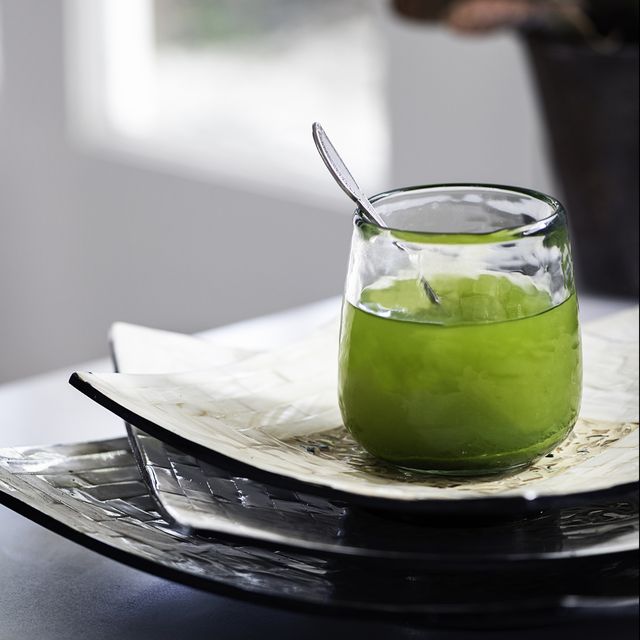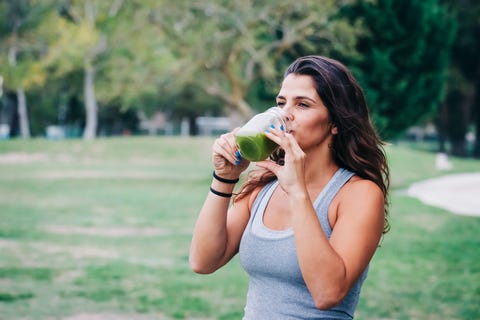
You may have noticed that the market for so-called “functional beverages” has exploded in recent years. These days you can sip your way through mushroom coffee, adaptogen seltzer water and prebiotic protein shakes. This family of spruced-up drinks now includes chlorophyll water. And the popular green elixir is certainly having a social media moment. After all, it has the color of nature so what’s not to like?
Like with any health trend, people make a lot of lofty health claims about chlorophyll. It’s been touted as a way to detox the body, boost weight loss efforts, improve energy and gut health, fight cancer, bolster the immune system, and even clear up your skin. Runners might turn to drinks like chlorophyll water when searching for an edge in their training and race results.
But before you indulge in the hype and try nature’s green juice, here’s what the science and a nutrition expert want you to know about the evidence versus anecdotes.
First, what exactly is chlorophyll water?
You probably first learned about chlorophyll back in high school science class when you were taught that it is a pigment that gives plants their verdant colour. Its main purpose is to help plants absorb energy from the sun during photosynthesis.
Typically, chlorophyll water is made by spiking filtered water with chlorophyllin—the water-soluble form of chlorophyll created by combining it with sodium and copper salts to make it more absorbable in the body. (Chlorophyllin is basically the supplement form of chlorophyll.) Other items like lemon juice, peppermint and vitamins such as vitamin B12 might also be included in a bottle of chlorophyll water. In addition to a pre-mixed water, you can also buy chlorophyll droplets that you add to your own H2O.
Some people confuse chlorophyll with chlorella, but they’re not the same thing. Chlorella is a type of algae that grows in freshwater, which just happens to contain chlorophyll.
Chlorophyll is also naturally present in a range of edible vegetables including spinach, arugula, parsley, and green beans. Wheatgrass shots are also a likely good source of the compound.
Is chlorophyll water good for you?
When you dig through the research it’s apparent that the marketed benefits of this green-tinged aqua have far outpaced the science.
One of the most popular claims associated with chlorophyll is weight loss support. However, research into its slim-down powers is currently very limited and far from robust. One study in the journal Appetite found that overweight women who took a chlorophyll-containing green plant membrane supplement for 90 days had greater weight loss and reduced appetite than a group that didn’t take the supplement. The reason for this difference is not known or if it would also occur with a 100% chlorophyll supplement.
“Certainly, if you are drinking unsweetened chlorophyll water instead of sugary drinks this could be a way that it contributes to improved body composition,” says Molly Kimball, sports dietitian. “But the chances it directly leads to noticeable bodyweight improvements is low.”
As many proponents have alluded to, a few scientists have also researched the potential anticancer effects of chlorophyll, much of which is attributed to its free-radical fighting antioxidant capacity. Chlorophyll itself may also bind to potential carcinogens (or cancer-causing agents) and may therefore interfere with their gastrointestinal absorption and reducing the amount that reaches susceptible tissues. But to date, there is a shortage of human trials regarding chlorophyll’s cancer-fighting efficacy, as most research has been largely conducted on animals. As Kimball notes, “there just isn’t enough data at this point to support this benefit.”
Still, there is a chance that the chlorophyll found within green vegetables like spinach and kale plays a part in cancer prevention, along with other antioxidants and nutrients contained in these foods. That’s why eating more of these veggies can help lower the risk for some cancers including colorectal and lung.
Some very preliminary research, including two pilot studies from the Journal of Drugs in Dermatology, suggests chlorophyllin can help improve some skin conditions like acne and sun-induced damage. But this occurred with topical use of chlorophyllin which is not the same as drinking the stuff. Although, Kimball says improved hydration status from drinking chlorophyll water may result in improvements in skin appearance if you are going from dehydrated to hydrated.
What about potential benefits for runners, specifically?

In theory, the antioxidants chlorophyll delivers could help athletes better adapt to training by potentially improving recovery, but there is no science as of yet looking at the impact of cholorophyll on athletes. “The antioxidant capacity of chlorophyll water is unlikely to be better than the antioxidants you get in regular vegetables and fruits,” Kimball says.
If you are one of those people who struggles with drinking enough plain tap water, using a beverage like chlorophyll water can help keep your fluid levels topped up. “The added hydration factor can boost energy, particularly in those who are chronically low-level dehydrated,” explains Kimball. But there is nothing particular about the drink that will make you feel like you can run forever and the placebo effect is likely at play when it comes to the energy-boosting qualities attributed to chlorophyll water. You are drinking something that you are told is healthy and will energize you, so you feel like a million bucks after downing a bottle.
Also, there’s something in the idea of changing your overall mindset toward health when drinking chlorophyll water: “You’re actively doing something for your wellness, being proactive and mindful, by adding a product like chlorophyll water [to your routine], which translates to an enhanced focus on other areas of your wellness including nutrition and movement,” Kimball says.
Are there any drawbacks to drinking chlorophyll water?
It’s worth noting that, as with most drinks, you really have no idea how much chlorophyll you are getting and if it is enough to bring on any benefits. Chlorophyll supplements (including those added to water) aren’t strictly regulated.
One regulatory agency states that adults and children over the age of 12 can safely consume 100 to 200 milligrams of chlorophyllin daily, but that consumption should not exceed 300 milligrams. There are no known major health risks of consuming the amount of chlorophyll you would get from drinks on the market, though Kimball cautions that it may cause GI distress, including nausea and diarrhea, in some people, particularly when drinking higher amounts.
One more caution: You may end up with a temporary green coloration of your teeth and/or tongue, which could look a little freaky.
So, should you pick up a bottle of chlorophyll water?
While there might be some added benefits to drinking chlorophyll water over plain water, the evidence to date for how it supports your health and performance is scant. “There is no harm in trying it and the drink can be a more exciting way to stay hydrated than regular water, but you will probably reap more benefits from eating green veggies,” says Kimball. (Keep in mind, you also have to pay extra for this type of water.)
So, while the jury is still out on all the advertised perks of chlorophyll, we are confident in saying that a spinach salad will do your body some good.